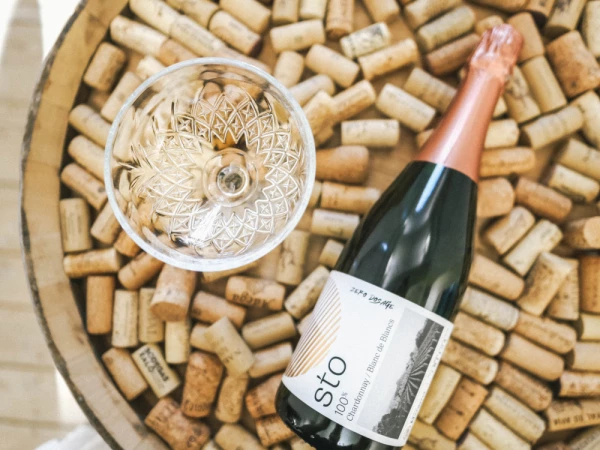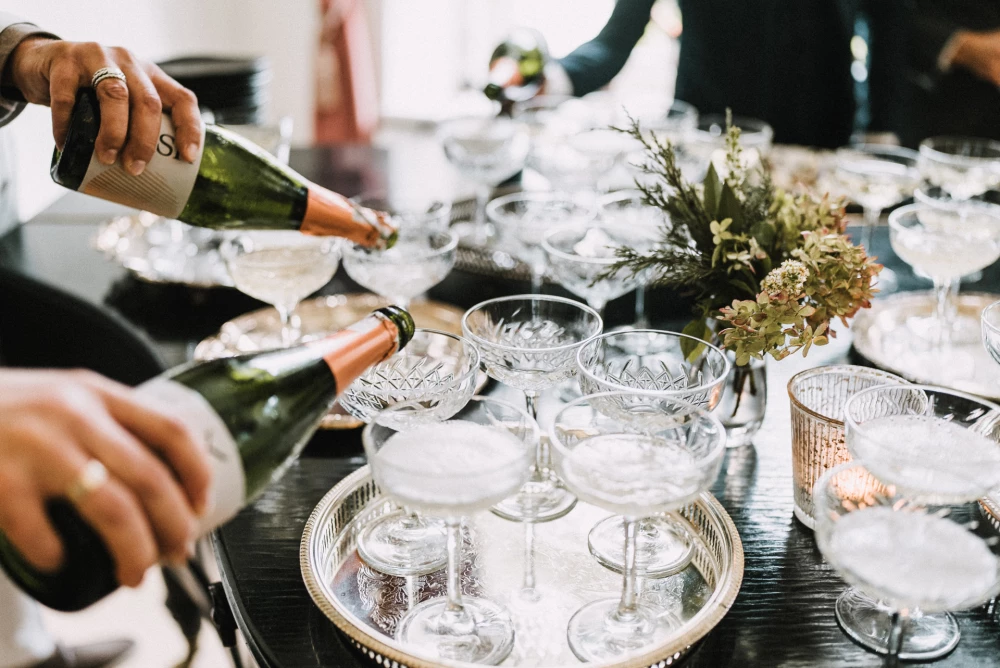Text prepared by: J.Patterson
What began as a family home is now a rising star in Polish sparkling wine. We caught up with the owner of Winnica Margaret to hear the story behind the label.

Text prepared by: J.Patterson
What began as a family home is now a rising star in Polish sparkling wine. We caught up with the owner of Winnica Margaret to hear the story behind the label.


Just before bud break and the start of peak event season—when bottles of bubbly are popping and pouring into more etched glasses and champagne towers than we care to count—we had a thought. Why not interview the man behind not only the best bubbles in town, but quite possibly some of the best in the world (and no, that’s not just the wine talking)? At Winnica Margaret, Michał Przytuła makes crisp, elegant sparkling wines with care, curiosity, and zero pretense. We sat down to talk bubbles, soil, and how it all began.
A quick note: This story features wine and winemaking—best enjoyed (and read) by those 18+.
A behind-the-scenes look at Winnica Margaret, a small vineyard in Zielona Góra where Michał Przytuła crafts elegant Polish sparkling wines with méthode traditionnelle.
Tucked within Poland’s foremost—but still under-the-radar—wine region of Zielona Góra, Margaret Vineyard (Winnica Margaret) is a place shaped by care, curiosity, and craft. Owner Michał Przytuła’s journey—from squash coach to sparkling wine producer (and a good one at that)—has become a story of family, soil, and effervescence.
Nearly a decade ago, the vineyard began as a family home project. Michał’s mother purchased the land intending to build a house, but old records suggested a vineyard had once thrived here. At the same time, Poland’s budding wine scene—particularly its growing love for méthode traditionnelle—was beginning to take off, thanks in part to Champagne-born Guillaume Dubois and other producers rediscovering the region’s winemaking roots. Inspired by this revival and the region’s rich past—steeped in nearly a millennium of viticulture (you read that right)—Michał planted vines of his own. His mother, Małgorzata (Margaret), embraced the shift—even if it meant saying goodbye to her original house plans.
The first harvest came in 2019/2020, marking the start of a new chapter—one rooted in tradition, shaped by modern insight, and powered by no small amount of inspiration (and drive) on Michał’s.
Today, Margaret Vineyard focuses on cool-climate grapes like Riesling, Chardonnay, and a touch of Pinot Noir—varieties well-suited both to Zielona Góra’s heavy clay soils and to traditional-method sparkling wine. Michał produces sparkling wines almost exclusively, letting their crisp acidity, minerality, and elegance shine through. His low-intervention approach and deep respect for the land have positioned Margaret Vineyard as a standout in Poland’s evolving wine scene.
In our opinion, it’s the vineyard to watch—and one of the best small-batch sparkling producers not just in Poland, but in north-central Europe. There, we’ve said it.
So earlier this spring, we thought—what better way to spend a brooding, overcast afternoon than chatting with Michał about bubbles, terroir, and what’s next?
Michał: I started in 2017 with just half a hectare (over an acre). Each year the vineyard has grown. Today it’s 3.5 hectares, and another is on the way. We mainly grow noble grape varieties for sparkling wines: Riesling and Chardonnay. As a test, we also planted Pinot Noir and a little Gewürztraminer. Everything is cultivated by hand.
“Noble varieties” refer to classic grapes known for producing age-worthy wines—often originating in France and Germany.
Michał: Everything starts in the vineyard. We have a unique site—a south-facing slope with heavy clay soil. It’s difficult to work with: in summer, it forms a hard crust; when it’s wet, it becomes sticky and can block equipment. But the payoff is great in terms of minerality and structure. It’s demanding, but it rewards you with quality in the glass.
Michał: Now, we’re already transitioning to a more balanced system that reduces chemical use, protects the soil and microbiome, and supports the wellbeing of the plants. We want our wines to feel even more connected to their place of origin.
Integrated farming has gained traction in Europe—especially in Switzerland and Austria in the last two decades—where sustainability is central. It balances modern farming with ecological care.
Michał: Occasionally, yes—we release small batches of still wines. Most are collaborations or special-order projects. We want to show that we can do more than bubbles. But honestly, 97% of our production is sparkling—that’s our main focus.
One standout? Pretekst, a still Chardonnay with surprising balance and depth. While many Polish wines lean bright and fruit-forward, the clay-rich soils here give this one a distinctly mineral backbone and texture—more reminiscent of certain French, Italian, or even Greek wines.
Michał: Starting with the next vintage, we’ll take a more natural approach—releasing wines that are unfiltered, bone-dry, like Extra Brut (low dosage) or Brut Nature (zero dosage), and in some cases using malolactic fermentation or partial barrel aging.
This direction was inspired by a trip to Champagne, where I tasted hundreds of wines from top producers. That experience really influenced how I think about wine—it opened me up to a new approach.
“Extra brut” (or “low dosage”) and “zero dosage” refer to sparkling wines with little or no added sugar—resulting in clean, focused flavors with real edge and elegance.
Malolactic fermentation softens acidity in wine, giving it a rounder or creamier feel.
Michał: Brut Nature is only a small part of our production—it’s an extremely dry wine with no added sugar. But it has its fans, and we make it for them.
We count ourselves among them. This one’s a standout—bone-dry, beautifully balanced, and none of the lip-puckering sharpness you sometimes get in the style. Just clean, vibrant, and endlessly sippable.
Michał: Definitely white wine. Although the season makes a difference—during the summer I reach for whites, in winter I tend to enjoy reds more. I love discovering new flavors, and reds can be fascinating at certain stages of development. But from a production perspective, in Poland it’s definitely easier to achieve high-quality whites—so that’s the direction Margaret Vineyard is following.
Michał: I don’t have one favourite cuisine, but Italian food never lets me down. I also enjoy traditional Polish cooking because it offers lots of opportunities for pairing with wine. People often ask me what to serve with sparkling wines. The answer? Surprisingly broad.
Michał: It works wonderfully with tempura dishes, soft and hard cheeses, crispy snacks, and even simple meals made with seasonal vegetables. It’s a great match for roast chicken, fish, risotto, or grilled dishes.
I also love unexpected combinations—like sparkling wine with popcorn drizzled in truffle oil. That’s my guilty pleasure. Or a classic Polish pork cutlet with cabbage and a well-chilled brut—seriously, try it sometime.
Sparkling wines are incredibly versatile, adaptable, and equally at home at a formal dinner or a laid-back evening with friends. Maybe that’s why I got so hooked on them.
Why it works: The bubbles and acidity in sparkling wine cut through fat and salt like a squeeze of lemon—refreshing and cleansing with every sip.
Michał: Envínate Benje Blanco 2022 from Tenerife. It comes from volcanic soils, has beautiful minerality, and a very ripe yet fresh aromatic profile. Absolutely magical. I love wines that tell the story of where they come from—and this was one of them.
In case you’re curious: "Minerality" is a tasting term used to describe flavours or aromas reminiscent of stone, chalk, or even sea breeze—often found in wines from mineral-rich or volcanic soils.
Michał: I still work in sport—I’m a squash coach, and that hasn’t changed. Wine is my second passion, and I pursue it with full commitment. Interestingly, squash and wine have a lot in common. In both, you need to make decisions, adapt to situations, and look for solutions. In sport, just like in grape growing—if you don’t react in time, you lose.
Michał: The vineyard is named after my mother, Małgorzata (Margaret). She was one of the few people who believed in this project from the very beginning. She still supports me today, even with vineyard work. She’s simply a good mother—and for that alone, she deserves to have her name on the label.
Michał: Yes—we’re currently building a house at the vineyard, which will allow us to host wine tourists. Wine always tastes better when enjoyed among the vines. If everything goes according to plan, we’ll open in two to three years. For now, we’re focused on developing the winery (building) itself, and eventually we’ll shift that focus towards organizing tastings, events, and bringing wine and food together in a full, complementary experience.
For those looking to explore this formidable wine region—a hop, skip, and a jump from the palace—private charters can be organised for groups of 4 to 40. Whether you're after a full day of tastings or just a curated stop at Michał’s vineyard, let us know.
Michał: We’re continuing to improve quality, expanding our Pinot Noir plantings—it’s a variety with huge potential. We plan to release a rosé and continue crafting sparkling wines from classic grapes like Riesling and Chardonnay. We see the potential here, and we want to make the most of it.
Michał: I’d want them to know that Margaret Vineyard is a project born of passion, hard work, and a desire to keep learning and improving. Each bottle reflects that journey. It’s also the story of a place that’s slowly making its mark on the Polish wine map.
Curious to taste it for yourself? Whether you’re planning a group stay, a wedding, or just a cozy weekend away, there are a few delicious ways to enjoy Michał’s bottles—and other local gems—while you’re here.
Staying at the castle? Our Stock-the-Pantry service lets you pre-order from local winemakers, brewers, and farmers so your kitchen is filled with regional wines and seasonal produce when you arrive. Great for self-catering or spontaneous late-night snacking.
Hosting a catered event? Add a self-serve wine bar with the expanded local wine offer, or ask us about a curated selection of méthode traditionnelle bottles from Winnica Margaret. And if you're staying a few nights, why not book a private tasting in the castle cellars? No travel required—just swirl, sip, and enjoy.
Na zdrowie.